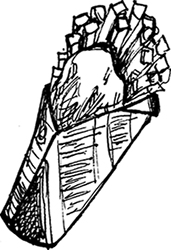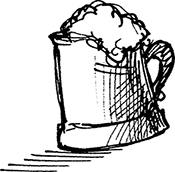
I had a brain wave,” Neil said as they wrapped up what Neil called a “passable” late dinner of braised lamb. Neil had offered to help out in the kitchen at least ten times, and had even written a recipe for a better marinade on a napkin. But the chef eventually sent back a note offering a free basket of yam fries if Neil would just sit and be quiet.
Larry had agreed instantly.

“Brain wave? Don’t you need a working brain for that?” Larry joked as he grabbed the last yam fry and popped it in his mouth.
“Not that you’d have any experience,” Neil said. “Anyway, before I got conked on the head, I was looking at some cookbooks.”
“There’s a shock,” Larry said.
Rose rolled her eyes. “Cookbooks? That’s your brain wave? Please, somebody call the Nobel committee—we’ve got a bloody genius here! Isabella, don’t let this one get away.”
“Rose,” Isabella said. “We are here looking for help, not a fight.”
Rose sat back in her chair. “Okay, fine. I’m all ears.”
Neil frowned. When had Rose taken over as the boss of this whole operation again? Of course, he had to admit that he and Larry hadn’t been getting very far before they’d met her, so he swallowed his criticism.
“There was this one cookbook that was all about the food from Shakespeare’s time. I didn’t get a chance to read it, but it got me thinking about a pattern that might tie all those numbers together.”
“Go on,” said Rose.
“Well, we were wondering why Kemp would hide the clue in honey and then add all that extra honey to the case.”
“It doesn’t make sense.”
“Right. But what if Kemp was using the honey to tell Shakespeare that the key to everything was food?”
Rose considered this for a bit. “So the bit about ‘tasteless gruel’ was maybe one more hint that food is the hidden clue that ties all the numbers in the note—let’s call it the key code—together?”
Neil nodded. “It’s a start, anyway.”
“Yeah, and that key he drew on the key-code paper definitely looks like a fish. Yuck.” Larry shuddered.
“Are there a lot of food references in Shakespeare?” Neil asked.
“Hundreds.” Rose relaxed her body position and bit her lower lip as she considered what Neil was saying. “Jones, I need a computer fast . . . fast!”
Jones growled.
“C’mon, Jones,” Rose said. “I know you always have one in the car. Just like that time in Vienna. Remember that week?”
Jones growled again but got up and walked out the door.
Rose watched his back with an amused smile.
Neil looked over at Isabella, and pointed at Jones and then Rose. There was definitely some history between them.
Isabella just mouthed, Later.
Jones returned after a minute or so with a laptop and put it down in front of Rose.
Rose lifted the lid and smiled. “Isabella, tell Jones he’s a peach.”
Jones growled again, but Neil thought he noticed a softer tone—less rottweiler and more English bulldog.
“It’s nice to see everyone getting along . . . finally,” Isabella said, smiling.
“So, let’s see what we get if we narrow it down to food references,” Rose said. She started typing furiously. “Hmm, you’d be surprised how often Shakes mentions wine, ale, beef, spices, even eggs. . . .” She ran her finger over the computer screen. “Still seems very random. There are too many hits.”
Neil seemed disappointed. As with most of his hunches he was absolutely convinced he was right. He had an idea. “Wait. You said Kemp died in 1601? We should only check the plays before that!”

Rose smacked herself on the head. “Idiot,” she said.
“An honest mistake,” Neil said.
“I was referring to you, ya dope. I told you he died in 1603 about ten times, and I already factored that all into the list. No wonder you need help so much.”
Larry laughed. Neil elbowed him in the ribs.
“Okay, but how many food references can there actually be in all those plays?” Neil asked.
Rose looked at the screen. “At least two hundred.”
Neil rubbed his temples again. “Shakespeare was a genius. There’s no way Kemp left him a simple clue. Not if the treasure is worth as much as Kemp suggested. There has to be more.”
Neil looked at the picture of the note again. Drake? Globe? Robe? What the heck was Kemp getting at? “Maybe he hid the jewel in the Globe Theatre? Why don’t we just go there and look?”
Rose groaned. “The Globe Theatre that’s in London today is just a replica. The original burned down in 1613, during a play. They fired off a real cannon and the sparks ignited the scenery.”
“I hope they gave everyone their money back!” Larry said.
“No one was hurt. They rebuilt within a year. If there’d been something valuable hidden there, they’d have found it in the rubble way back when.”
“How do we know they didn’t?”
“We don’t, but I don’t think that’s the case. The poem says ‘around the globe,’ not ‘in the Globe.’ Also, I don’t think Kemp was that stupid, or at least that obvious. This key-code note is more complex than that. He wouldn’t risk Shakespeare—a genius, as you mentioned—finding the jewel by accident.”
Neil was silent, racking his brain for some kind of lead. Rose had said Kemp loved codes. He’d even hidden his own name in a poem celebrating his Morris-dancing journey to Norwich. He’d written a whole book about the journey and attacked his critics with a nasty dedication.
Clearly, Kemp was a man with a huge ego. Huge ego . . . huge ego . . . why did this seem important?
“Wait! I’ve got it! Huge ego!”
“We know you have a huge ego,” Larry said. “You don’t have to yell it so loud.”
“No, not me. Kemp.”
“So, chef boy, another brain wave?” Rose asked.
“Two in one day!” Larry said.
Neil nodded and spoke in a low voice. “Kemp had a huge ego. How many of the food references come from lines in the plays that might have been spoken by Kemp himself?”
Rose looked back at the list and considered. “Well, let’s assume from what we know that he played Falstaff, Bottom, and some of the other comic roles.”
Rose began isolating some of the quotes, her smile growing the whole time. “Isabella, I take everything back. He isn’t a complete idiot.”
“What?” Neil said.
“You sure?” Jones said.
Larry just laughed.
“So what are we left with?” Isabella asked.
“Some interesting possibilities.” Rose looked at the screen. “In The Merry Wives of Windsor, Falstaff calls someone a cabbage. And in A Midsummer’s Night Dream, Bottom makes reference to honey, peas, mustard seed, oats. Then in Henry the Fourth, Part Two, Falstaff makes a reference to cheese and even radishes.”
“I knew there was a pattern,” Neil said smugly.
“Yes, we have a wonderful shopping list. We could make an amazing dinner!” Rose said, with obvious sarcasm. “But what the heck does it have to do with finding anything like a jewel? Did Kemp hide it in a supermarket?”
Neil frowned. “You’re supposed to be the Shakespeare scholar.” He slunk back in his seat, sulking.
“You’re supposed to be the food expert! So is there anything you can tell me about Elizabethan food that might help?” Rose said.
Larry coughed. “If I may interject, Neil wouldn’t know Tudors from toenails. But, I, on the other hand, am a lover of history. Let me have a crack at the code that ’tis hidden among the gruel of the honey-tongued Shakespeare. If I may, m’lady?”
Rose passed him the laptop.
“Let’s look at those quotes again, but then cross-reference them to the letters from the key code.” Larry highlighted the passages. “Interesting. In one of the plays, Falstaff makes a reference to cheese. And that play just happens to be Henry the Fourth, Part Two.”
“So?” Neil said.
“Look at the first sequence of letters on the key code.” Larry pointed to them and read, “IVII III II.”
“Still confused,” said Neil.
“Rose said right off that the letters are references to Shakespeare’s plays. They tell us the act, the scene, and sometimes even the name of the play.”
Neil looked at the numbers but was still confused.
Rose’s eyes grew wide. “IV is Henry the Fourth!”
Larry nodded. “And if the next two Is are for part two, that leaves five more Is. That’s either act three, scene two, or act two, scene three.”
“Why?” Neil said.
“Roman numerals. You can only have three Is together before you need a V. III is three. IV is four. V is five. VI is six, and so on up to VIII. After that it’s Is and Xs and . . . O, just forget about it,” Larry finished, noticing the look of confusion on Neil’s face. “O, get it?”
Rose had called up Falstaff from act three and pointed the quote out to Larry, who read.
“ ‘I do remember him at Clement’s Inn like a man made after supper of a cheese-pairing: when a’ was naked, he was, for all the world, like a forked radish, with a head fantastically carved upon it with a knife.’ ”
Larry sat back with a satisfied smile. “What, no applause?”
Neil clapped as sarcastically as possible. “So we have to look for cheese? That didn’t work out so well for me last time.”
Larry groaned. “Look, let me explain it again. The food is just the tip-off. The letters point to a play where Falstaff—a character Kemp played—is talking about cheese. But in that clue we end up with an actual London place to look. Clement’s Inn.”
“So we need to look for Clement’s Inn?”
Larry nodded. “I think that’s what Kemp is getting at with the first series of numbers.”
“How does this tie in to all the Drake and globe stuff?” Neil asked.
Larry pursed his lips and scratched his head. “Um . . . one step at a time.”
“Well, it’s something to start with anyway,” Rose said, yawning. “In the morning.”
Neil yawned as well. He was still jet-lagged from the flight.
“Tomorrow after breakfast seems like a good time to start.”
They all nodded.
“The name of that place again?” Jones asked.
“Clement’s Inn,” Larry said.
Jones typed the name into his phone. “Well, there’s good news and bad news. The good news is that I can get us there.” He stood up and walked away, calling back over his shoulder. “The bad news can wait until tomorrow.”
